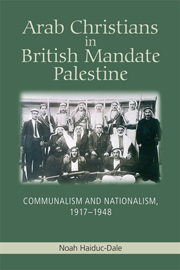Book contents
- Frontmatter
- Contents
- List of Illustrations
- Acknowledgements
- Introduction: Nationalism and Religious Identification
- 1 1917–1923: Balancing Religion and National Unity
- 2 1923–1929: Christians and a Divided National Movement
- 3 1929–1936: Towards Communalism
- 4 1936–1939: Standing Aloof? Arab Christians and the Great Revolt
- 5 1940–1948: National Strength through Communal Unity
- Conclusion: Nationalism and Communal Identification – Conflicting Identities?
- Bibliography
- Index
Conclusion: Nationalism and Communal Identification – Conflicting Identities?
Published online by Cambridge University Press: 05 October 2013
- Frontmatter
- Contents
- List of Illustrations
- Acknowledgements
- Introduction: Nationalism and Religious Identification
- 1 1917–1923: Balancing Religion and National Unity
- 2 1923–1929: Christians and a Divided National Movement
- 3 1929–1936: Towards Communalism
- 4 1936–1939: Standing Aloof? Arab Christians and the Great Revolt
- 5 1940–1948: National Strength through Communal Unity
- Conclusion: Nationalism and Communal Identification – Conflicting Identities?
- Bibliography
- Index
Summary
Arab Christians in Palestine constantly renegotiated their place in society and the meaning of their religious identification during the British Mandate. They shaped their relationship to Palestinian nationalism in debates among themselves as well as with the British, Zionists and other Arab communities in Palestine. The Arab Christian story is neither simple or linear, nor is it even one story. Contrary to generalised accounts of Christians during the Mandate, religion was neither insignificant nor essentially determinant, and its relationship to society and politics varied from Christian to Christian based on a wide range of influences. Certainly, the politics of the Mandate played a very important role; as Palestine changed, so too did intercommunal relationships among Arabs. Variations among Christians, hardships brought about by the First World War, the collapse of the Ottoman Empire, the arrival of British troops, the consolidation of British control as a League of Nations-appointed mandatory power, the growth of the Zionist movement, and developments within the Palestinian national movement all contributed to drastic shifts in Arab society.
The two historiographical trends commonly found in the study of Palestinian Arab Christians share an assumption of communal homogeneity even while arriving at drastically different conclusions. That is, the discussion of Christian-Muslim relations is often based on the assumption that religious affiliation meant the same thing to most, if not all, Christians, and that Christians comprised a single group.
- Type
- Chapter
- Information
- Arab Christians in British Mandate PalestineCommunalism and Nationalism, 1917-1948, pp. 196 - 201Publisher: Edinburgh University PressPrint publication year: 2013



